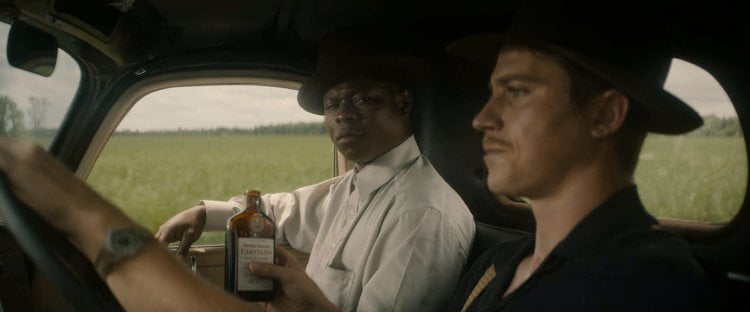Mudbound

When Laura's (Carey Mulligan) brother brings his boss Henry McAllan (Jason Clarke, "Dawn of the Planet of the Apes") home for dinner one night, the schoolteacher who'd resigned herself to spinsterhood enjoys his attentions enough to accept his proposal, despite a lack of passion. She loves her domestic life in Memphis raising their daughters, but when Henry uproots the family to buy a rural cotton farm, Laura witnesses Henry and his father's (Jonathan Banks, TV's 'Better Call Saul') racist attitudes towards their sharecroppers, the Jackson family. They are all "Mudbound."
Laura's Review: B+
Cowriter (with Virgil Williams)/director Dee Rees ("Pariah") tackles an epic story from the Deep South to WWII battlefields, adapting Hillary Jordan's novel from multiple points of view with the assurance of a far more experienced filmmaker. Told largely from the perspective of Laura and Florence Jackson (soul singer Mary J. Blige in her film debut), whose voice over narrations give their segments the feel of an intimate diary, and Henry McAllan's brother Jamie (Garrett Hedlund, "Unbroken," "Pan") and Florence's son Ronsel (Jason Mitchell, "Detroit"), whose wartime experiences are told more conventionally and whose return escalates the drama, "Mudbound" is a complex, multi-layered movie with a gut punch of a climax. If the film has a central character, it's Laura, the pretty, well bred woman we initially meet completely changed, both physically and emotionally, at film's end. Before she's even married, a red flag is raised when her future brother-in-law asks her for a dance, the two obviously sparking. The attack on Pearl Harbor calls Jamie off to war, though, and we meet Florence sending her son off to battle as her husband Hap (Rob Morgan, "Pariah") relates the two hundred years his family's worked the land they've never owned, his lifelong dream for his hard won savings. Henry never apprises Laura of his plans and suddenly she finds her comfortable life uprooted as they head into the country with their belongings. Things take an even worse turn when Henry's embarrassed to discover he's been fleeced, the owner of the home he rented having sold it, absconding with his deposit. Laura finds herself making a home out of a dilapidated shack with no running water, but puts her foot down about keeping her piano, relegating Henry's awful Pappy to a shed out back. Life becomes toil and dirt, Laura's one comfort a weekly bath. Then the intricate, codependent relationship between the McAllans and Jacksons reveal ugly truths about life in the Mississippi Delta. Henry turns out to be a hard man and when Hap breaks his leg, thinks only of his crops. It's Laura who takes money from their safe, giving it to Florence for a doctor. Henry has no qualms about making more demands of the family he treats so ruthlessly, calling for Florence in the night when his girls are sick. Jamie returns from the war with PTSD, a drinking problem and sympathy for his sister-in-law. Ronsel, who's left a white lover in Germany, is reintroduced to Jim Crow laws by Henry and Pappy, but befriended by Jamie over shattering shared war experience. But when Pappy spies Ronsel in the front seat of their truck with his son, the consequences are horrific. The adapted screenplay encompasses many themes - our relationship to the land (the film opens with Pappy being lowered into it), sisterhood among women despite race and class (Laura has a hair-raising encounter with Vera Atwood (Lucy Faust, "Strange Weather"), a pregnant white sharecropper's wife unhinged by her husband's abuse), the contrast in black soldiers' treatment in Europe versus home and the very roots of racism and white male rage. Hope for the future is glimpsed in the corners in Ronsel's youngest sister's goal of being a stenographer. The production makes us feel the dirt and sweat, production design (David J. Bomba, "Walk the Line") and cinematography (Rachel Morrison, "Fruitvale Station") throwing back into a world of sublime light and seductive landscapes. Men's attempts to tame the latter leave misshappen structures, unleashing insects and other obstacles. European vistas are greener, more welcoming, but the war fought there leaves more blight, shattered skulls in place of copilots and tank gunners. The large ensemble cast is uniformly excellent. Mulligan walks a line between standing Laura's ground and keeping the peace, her long denied needs bursting forth after continual sacrifice. Blige plays a similar role more stoically, the color of her skin dictating battles already lost. Clarke's surface appeal of manners and competence cover a hereditary hardness and self doubt. Banks is ugliness personified, standing alongside "Detroit's" Will Pouter as the snarling face of racism as empowerment. Morgan is lovely, the epitome of the hard working family man whose love for his wife is far more evolved than his 'better's.' But it is the relationship that Mitchell and Hedlund bring to life that is the film's heart and soul, two men stripped down to their essences coming through fire damaged yet propping each other up so each may move towards the light. Grade:
Robin's Review: DNS
DNS

